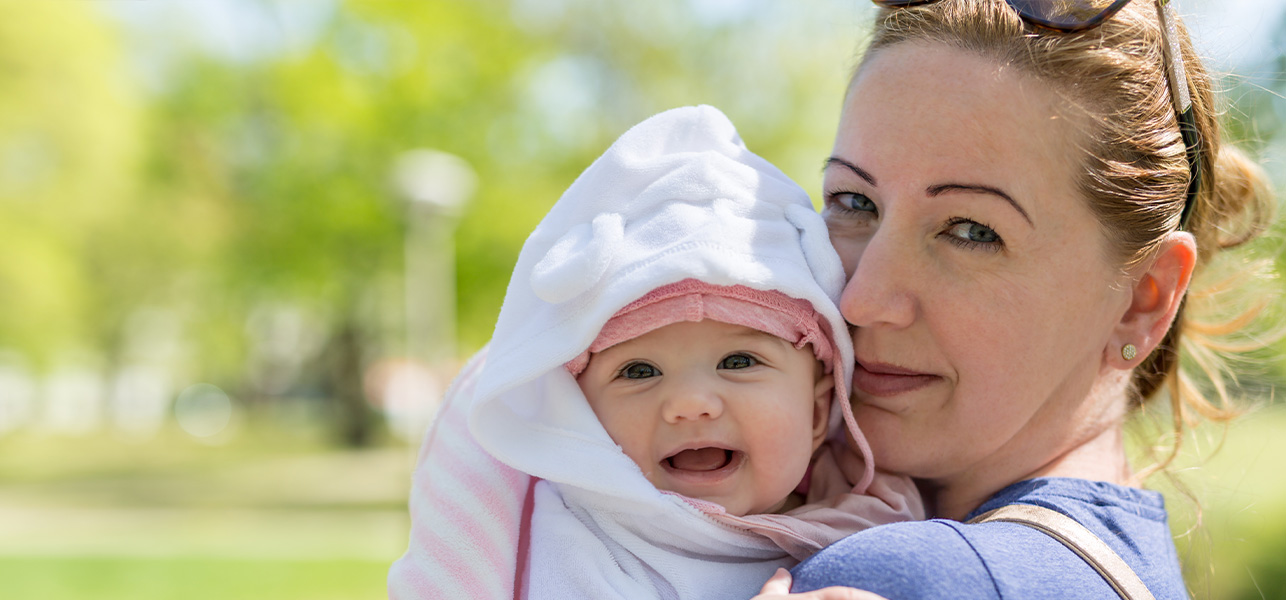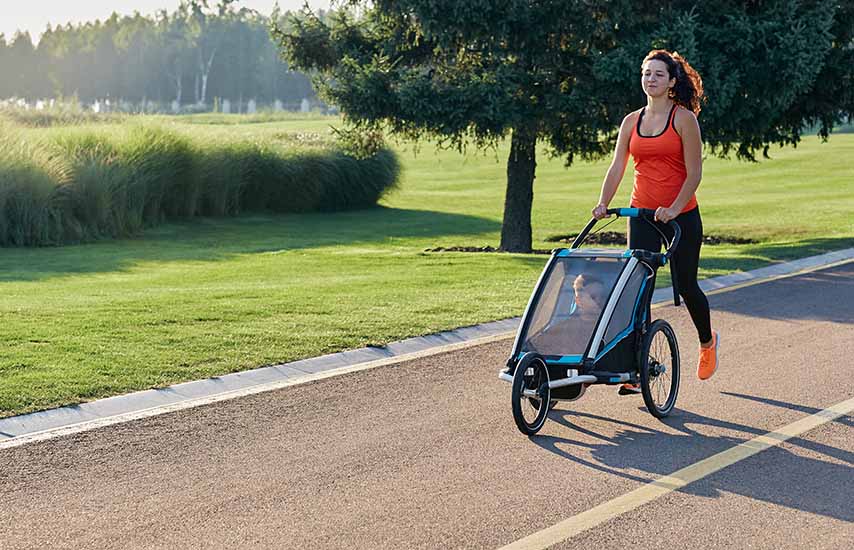Weight Loss After Pregnancy: How to Get Your Body Back and Feel Great

Achieving weight loss after pregnancy can be difficult.
Many women search for weight loss methods after pregnancy that claim to help them lose weight rapidly. Yet, strict exercise interventions and extreme diets can harm your health and lead to several unsafe effects on your body, such as metabolism damage and loss of muscle mass.
A healthy diet and exercise regime can contribute to a smoother weight loss journey, and a dietary plan will assist your weight loss efforts. But many other methods can contribute to sustainable weight loss.
In this article, you’ll learn key methods for weight loss after pregnancy.
Weight Loss After Pregnancy: 10 Tips and Strategies for Safe and Effective Weight Loss
Effective, sustainable weight loss and returning to your pre-pregnancy weight may seem challenging. But consider these tips to help you lose weight effectively.
#1 Avoid fad diets
You may want to try a new diet plan that promises rapid weight loss or fast results, such as losing more than 2 pounds a week but proceed cautiously with such diets. Fad diets require you to deprive the body of specific food groups or follow strict menus.
These diets can harm your health, especially as a new mother. Cutting too many calories may reduce your body’s breast milk quantity and lead to several intolerable side effects, including dehydration and fatigue.
They are not a good way to lose weight because they only lead to water weight loss and loss of lean muscle. And since fad diets only focus on caloric intake and not healthy diet choices or exercise regimes, they often do not lead to sustainable weight loss.
#2 Keep it realistic
Despite the myths you may have heard about rapid weight loss after pregnancy, losing baby weight requires a lot of time. According to a study, 75% of women could not return to their pre-pregnancy weight even after 1 year after the pregnancy.

Advertisement
Keeping realistic about postpartum weight retention and how it affects your ability to lose baby weight is important. Excessive weight gain and retention during and after pregnancy may lead to long-term obesity, so keeping your weight loss goals realistic is important.
Aim to drop the pounds over 20 weeks instead of a short period. Goals such as these can help you sustain a healthy weight instead of noticing initial weight loss and later gaining more weight due to unrealistic goals.
#3 Eat nutritious foods
Many studies found that just exercising without dietary changes wasn’t effective on its own. For this reason, it’s vital to eat healthy foods that contain important nutrients, such as whole grains and fiber, which can help you feel fuller for a longer period and contributes to weight loss.

Fish, legumes, lean meat, and fruit (such as plums) contain healthy nutrients such as omega 3 (healthy fats), protein, and vitamins, respectively. By replacing ready-made meals with nutritious food, you can avoid unhealthy fats, calories, and sugar and focus on healthy weight management.
#4 Stay active
Committing to physical activity is a necessary lifestyle change that can contribute to weight loss after giving birth. Walking is one example of light exercise that can help you burn calories; less intense than running for weight loss, meaning you may have to commit to longer walks to notice the weight loss benefits.

On average, a 155-pound person who walks at 3.5mph for 30 minutes will burn 107 calories, while a 155-pound person who runs at 5mph for 30 minutes will burn 288 calories.150 minutes of moderate aerobic activity each week is the recommended amount for postpartum women. Distributing this physical activity throughout the week is also ideal, but joining a postpartum exercise class is ideal if you need additional guidance.
#5 Eat smaller portions
While breastfeeding women are not recommended to skip meals, and skipping meals can affect postpartum recovery, one option to lose weight is to eat smaller portions. You may consider using a smaller plate to reduce your portions and food intake or recording the food you consume in a food diary.
It’s always important to choose healthier foods, even if you eat smaller portions, so avoid limiting your fruit and vegetable intake.
If you eat smaller portions, you may consider using a nutrition app with a nutrition information database to check the nutrients you consume. Nutrition experts suggest that nutrition apps can help you live a healthier lifestyle and lose weight when combined with regular exercise and avoiding sugary or fatty foods.
#6 Monitor your calorie intake
Counting your calories may help you determine the amount you are eating and whether there are any issues in your dietary plan. As you monitor calories, you may be more conscious of the types of food you are consuming and begin to choose healthy habits.
Even though counting calories can help you lose weight temporarily, and limiting your calorie intake to 1,500 or less can help you lose about a pound per week, maintaining weight loss requires you to consider the types of calories you consume.
For instance, avoiding foods containing high calories and refined sugars can help you avoid a surge in insulin levels, preventing the fat cells from storing the calories you consume.
#7 Avoid processed foods
Processed foods contain sugar, calories, and unhealthy fat, which can harm your health and lead to weight gain. Sugary cereal, fast foods, cookies, and chips are addictive and trigger dopamine signaling in the brain, which can cause unintended overeating and obesity.
Substituting processed foods with healthy meals can help you get the important nutrients you require and avoid counteracting your weight loss efforts. Keeping healthy snacks handy as a substitute for highly processed foods and eating them in moderation can help you avoid saturated fats and high salt intake.
#8 Include more protein
Lean protein and protein, in general, can speed up metabolism, helping you burn more calories in a state of rest and reduce the deposit of fat cells stored in your body. Since it also reduces ghrelin hormone levels, you may feel less hungry when you increase your protein intake when working toward your weight loss goals after giving birth.
Considering the source of your protein can be important before you consume it. For instance, protein bars may seem like healthy snacks, but they may contain high amounts of sugar that, when consumed excessively, may prevent weight loss.
On the other hand, lean protein containing less than 10 grams of fat can lead to calorie and weight reductions and enhance your dietary quality.
#9 Stay hydrated
It’s essential to stay hydrated after giving birth. It is an important factor for anyone who aims to lose pounds, and for most women, staying hydrated can help you replace the fluids you lose during milk production.
Drinking water, such as mint water, is an excellent alternative to sweetened beverages and reduces caloric intake. Choosing a glass of water instead of sweetened beverages can help you avoid 240 extra calories, helping you work toward your weight loss goal more easily.
Drinking water has many benefits, such as feeling more energized, reducing your appetite, and making digestion easier.
#10 Breastfeed (if you can)
Breastfeeding is mutually beneficial for you and your baby’s health. It enhances your infant’s immune system and can reduce your risk of certain cancers. It’s also ideal for helping you reduce extra weight after the first 3 months, which may make it easier to reach your pre-baby weight due to the caloric expenditures that lactation requires.
When is it Safe to Start Losing Weight After Giving Birth?
It is best to wait until your 6-week check-up before starting to lose weight after giving birth. By waiting until this time, you give yourself the best chance to recover after the birth. It’s also recommended that you start slowly, with less intensive exercise, such as short walks, as your body recovers.
It’s also important to take your time with post-pregnancy weight loss if you are breastfeeding a newborn. Waiting until your breast milk supply begins to normalize or your infant reaches 2 months is a recommended timeframe to wait before beginning to lose weight.
Is it Harder to Lose Weight After Pregnancy?
Because your body has to rebuild lost muscle mass after giving birth, which is related to your metabolic rate, it can be harder for most women to lose weight after pregnancy. Your body has to heal first, but when your muscle mass builds up again, this may increase the speed and ease at which you shed the extra weight.
Losing abdominal fat can be particularly difficult for new mothers because their metabolic rate slows and contributes to weight retention. For this reason, regular exercise is recommended.
How Much Weight do You Lose After Giving Birth?
Immediately after giving birth, you will have lost between 10 and 12 pounds – the combined weight of the placenta, amniotic fluid, and the baby. During the following first week, you’ll also lose 5 extra pounds as your body loses extra water weight.
Following the first week, you may lose approximately one pound a week by committing to regular exercise and dietary changes. So, in total, you may lose approximately 20 pounds of weight after you give birth within the first few weeks. However, this amount varies for each woman.
You may initially shed a lot of weight in the first few weeks, however, this may slow down slightly as time passes. Maintaining your exercise regime can help you return to your pre-exercise weight.
How Long Does it Take to Lose Baby Weight?
Reaching your pre-pregnancy weight and regaining your pre-baby body may take approximately 6 months after the birth. Each woman is different, and some may shed pounds faster than others.
You may lose half of the baby weight in the first 6 weeks, followed by slower weight loss over the next 6 months.
It’s recommended that you commit to postpartum weight loss over 20 weeks. Rapid weight loss or dropping over 2 pounds each week is never recommended as it can lead to exhaustion. Slower weight loss over time can be more sustainable and less damaging to your health.
A Word from a Personal Trainer
Losing weight after pregnancy may be challenging, and healthy choices are essential.
It’s important to avoid fad diets that promise rapid weight loss and to set realistic goals that do not damage your health. Losing weight too fast and getting quick results may not last and will lead to unsustainable weight loss. They can also lead to unhealthy effects such as fatigue and dehydration.
Ensure you give your body and abdominal muscles time to heal and rebuild after giving birth and pace yourself when you begin your exercise routine. At the same time, focus on developing healthy habits such as drinking enough water, exercising, and eating healthy food as part of your daily routine.
Weight loss after pregnancy varies from woman to woman, so your level of exercise, whether you’re breastfeeding, and your metabolism can all affect how much weight you lose after giving birth.
Conclusion
Weight loss after pregnancy is difficult, but healthy lifestyle choices can make the process easier. Remember to wait until at least your 6-week check-up before beginning your weight loss journey after giving birth, and avoid losing weight too quickly, as this is often unsustainable.

 1 source
1 source 






Comments (0)